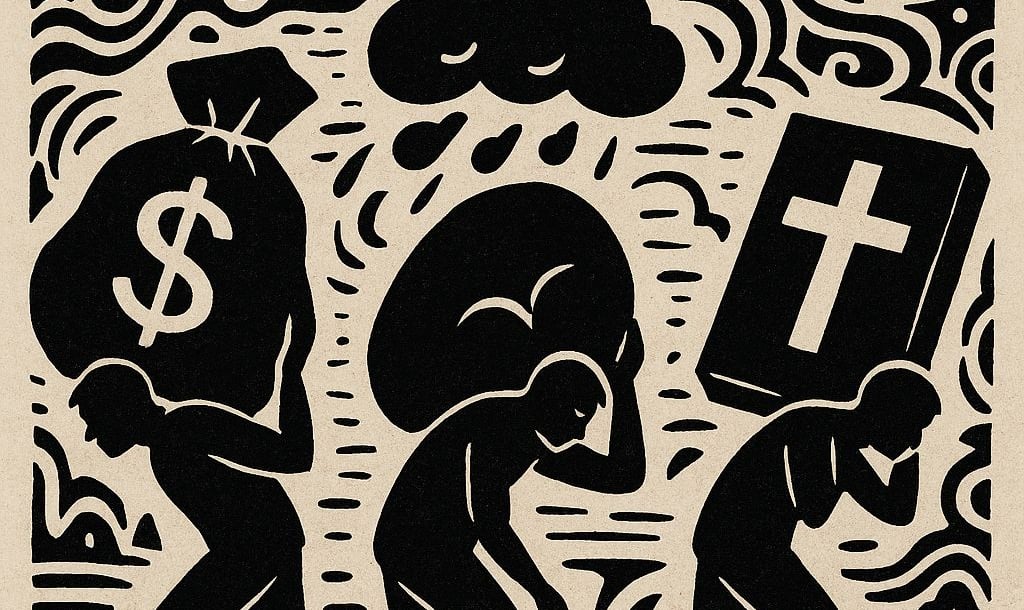Strategizing from 7 cities across the globe
The Problems that Choose Us
You probably can’t count the number of times you were irritated by someone else’s issues while comparing them to your own. Your problems which are so much more awful and worrisome, but most importantly, your problems which are yours and only yours. Our lives and perspectives are all relative. There is no absolute objective scale to weigh them on and no fair way to disregard them through comparison. But we tend to forget that notion too often.
TRENDSOCIOLOGYCIVIL SOCIETYPSYCHOLOGY
Jiany Samara
8/28/20254 min read


We humans cannot get enough of ranting about our problems, comparing them, and arguing over who has it worse.
You probably can’t count the number of times you were irritated by someone else’s issues while comparing them to your own. Your problems which are so much more awful and worrisome, but most importantly, your problems which are yours and only yours. Our lives and perspectives are all relative. There is no absolute objective scale to weigh them on and no fair way to disregard them through comparison. But we tend to forget that notion too often.
With that being said, the real question isn't about who has it worse, but about our problems themselves. It is an unfair world, and some have worries forced on them while others enjoy the luxury of choice. So, do we choose our problems, or do they choose us? And how do societies shape what we care about?
The world’s biggest worry, which shows up in many ways, is money. Interestingly, money isn’t only man’s biggest worry, but also the biggest determinant of all his other concerns. In other words, what I decide to worry about, and what you complain about, often depends on what’s in our pockets. For some, it’s inclusivity and freedom of speech. For others, it’s food supplies and corruption. This contrast is clearest when we look at wealthier countries compared to poorer ones. According to Ipsos’ What Worries the World study, developed nations like Canada and the United States focus on economic issues such as inflation and housing prices, while poorer countries face more existential concerns like food insecurity and corruption. For example, a 2024 Ipsos poll showed that 63% of Singaporeans cited inflation as their top concern, while in a lower-income country such as South Africa, 65% identified unemployment as their primary worry.
Eventually, once someone reaches financial security, a new void is often filled by other worries, and that is when socially driven issues tend to thrive.
This has contributed to a vast divide in cultural openness. Whereas wealthier nations have had the luxury, over the past century or so, to self-reflect and begin to confront old prejudice like racism and homophobia, others weren’t as lucky, forced instead to fight for freedom or simply worry about surviving the next war, revolution, or genocide. Even today, as some lower-income countries in the Middle East are making significant progress on social inclusion despite their many hardships, Western societies usually deem their work substandard. The latter often point the finger at them for being closed-minded or stuck in the past, without recognizing that questioning one’s own values is a privilege tied to prosperity.
While taking a deeper dive into this topic, I came to the realization that economic and geopolitical circumstances don't only shape our problems, but also the way we deal with them.
Throughout history, civilizations have depended on mutual moral codes to understand how to act in every situation they face. Moral codes are often dictated by religion, which are tied to geoeconomic circumstances. In fact, the latter shape the religious beliefs people hold. To understand how deep these differences run, we can look at how belief systems reflect social realities.
Let’s take Buddhism, which emphasizes self-reflection, meditation, and compassion and is a path that leads followers into personal spiritual discovery. It has gained popularity in wealthier, more stable individuals including some U.S. celebrities, who often embrace it as a form of mindfulness or personal growth.
On the other hand, Islam, while sharing many spiritual values, provides a clear framework of rules guiding daily life. Its presence reaches a wide range of environments worldwide, including both prosperous and conflict-affected regions. Islam especially thrives in places facing instability or hardship, where people are less able to question beliefs and are more concerned with immediate, life-threatening issues. Such structured guidance can offer comfort and order amid uncertainty. It can provide a sense of security and purpose, something deeply valued by people whose lives do not offer those comforts.
Yet, it’s important to avoid oversimplifying: Islam is practiced by millions in wealthy countries, just as Buddhism is practiced globally. Religions meet human needs differently depending on social context and personal circumstances.
What we can take away from this, however, is that not only do societies decide what topics get brought up at our dinner tables, but also shape moral codes which dictate our own judgments and approach to life.
So does an absolute moral code, like Kant’s ethics, exist? Or can we reliably judge how people deal with their problems?
It might not be possible for us to fully answer these questions yet, but it's evident that all humans can find in their very nature a guideline to their morality called empathy. It is our moral duty, in any circumstance, to use empathy together with methodical critical thinking to guide our actions, because being human means bearing the burden of caring about how our choices affect others.
Thus, what we see as worthy of our time and effort is nothing but a result of our life’s context, the fortunes and misfortunes, and the external forces beyond our control, but which become our responsibility to face, our problems to solve. As we walk the path of confronting these worries, we make decisions guided by a moral code built from our beliefs, beliefs we crafted to fit the circumstances of our lives.
We are social beings; our very existence depends on others, and so do our beliefs. Not everyone’s train of thought starts from the same place, nor do we all arrive at the same destination, and that’s okay. In an unfair world like ours, the desire and capacity to change our societies for the better depends on how well we cope with them in the meantime. Instead of dismissing people for what they think, we should examine how they are thinking. This shift, from condemning different perspectives to engaging with their ideas, is key to developing true critical thinking. Only then can we hope to build a wiser, more understanding world.
References
Nadler, Joseph. What Worries the World – July 2025. Ipsos, 31 July 2025. https://www.ipsos.com/en/what-worries-world?
Stark, Rodney, and Roger Finke. Acts of Faith: Explaining the Human Side of Religion. University of California Press, 2000.
